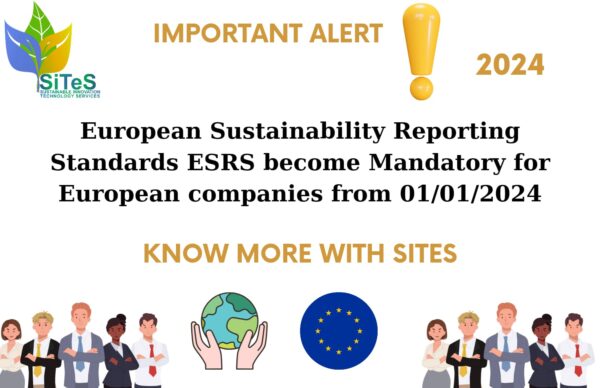
SiTeS is pleased to announce the upcoming implementation of mandatory European Sustainability Reporting Standards for European companies, starting from January 1st, 2024. This regulatory development, published in the Official Journal of the European Union (OJEU), aims to enhance transparency and accountability in environmental, social, and governance (ESG) reporting across the European business landscape.
The European Sustainability Reporting Standards (ESRS) are a set of standards developed by the European Lab Project Task Force on Climate-related Reporting. These standards aim to provide a common and consistent framework for reporting on environmental, social, and governance (ESG) factors by companies across European Union (EU) member states.
The ESRS cover a broad range of topics including climate change, biodiversity, human rights, anti-corruption measures, and more. They are designed to enhance transparency and comparability of sustainability reporting within the EU, enabling investors, stakeholders, and the public to assess the environmental and social impact of companies.
The development of the ESRS is part of the European Commission’s efforts to promote sustainable finance and sustainability reporting. The standards are aligned with international reporting frameworks and seek to streamline ESG reporting requirements, reducing the burden on companies and enhancing the relevance and usefulness of reported information.
Objective
The objective of European Sustainability Reporting Standards (ESRS) is to specify the sustainability information that an undertaking shall disclose in accordance with Directive 2013/34/EU of the European Parliament and of the Council as amended by Directive (EU) 2022/2464 of the European Parliament and of the Council Reporting in accordance with ESRS does not exempt undertakings from other obligations laid down in Union law.
Specifically, ESRS specify the information that an undertaking shall disclose about its material impacts, risks and opportunities in relation to environmental, social, and governance sustainability matters. ESRS do not require undertakings to disclose any information on environmental, social and governance topics covered by ESRS when the undertaking has assessed the topic in question as non-material, The information disclosed in accordance with ESRS enables users of the sustainability statement to understand the undertaking’s material impacts on people and environment and the material effects of sustainability matters on the undertaking’s development, performance and position.
The objective of this Standard (ESRS 1) is to provide an understanding of the architecture of ESRS, the drafting conventions and fundamental concepts used, and the general requirements for preparing and presenting sustainability information in accordance with Directive 2013/34/EU, as amended by Directive (EU) 2022/2464.
Categories of ESRS Standards, reporting areas and drafting conventions
There are three categories of ESRS:
(a) cross-cutting standards.
(b) topical standards (Environmental, Social and Governance standards)
(c) sector-specific standards
Application Requirements
Entity specific disclosures
AR 1. The entity-specific disclosures shall enable users to understand the undertaking’s impacts, risks and opportunities in relation to environmental, social or governance matters.
AR 2. When developing entity-specific disclosures, the undertaking shall ensure that:
(a) the disclosures meet the qualitative characteristics of information as set out in chapter 2 Qualitative
characteristics of information; and
(b) its disclosures include, where applicable, all material information related to the reporting areas of governance; strategy; impact, risk and opportunity management; and metrics and targets
AR 3. When determining the usefulness of metrics for inclusion in its entity-specific disclosures, the undertaking shall
consider whether:
(a) its chosen performance metrics provide insight into:
i. how effective its practices are in reducing negative outcomes and/or increasing positive outcomes for
people and the environment (for impacts); and/or
ii. the likelihood that its practices result in financial effects on the undertaking (for risks and opportunities);
(b) the measured outcomes are sufficiently reliable, meaning that they do not involve an excessive number of assumptions and unknowns that would render the metrics too arbitrary to provide a faithful representation.
(c) it has provided sufficient contextual information to interpret performance metrics appropriately, and whether variations in such contextual information may impact the comparability of the metrics over time.
When developing its entity-specific disclosures, the undertaking shall carefully consider:
(a) comparability between undertakings, while still ensuring relevance of the information provided, recognising that comparability may be limited for entity- specific disclosures. The undertaking shall consider whether the available and relevant frameworks, initiatives, reporting standards and benchmarks (such as technical material issued by the International Sustainability Standards Board or the Global Reporting Initiative) provide elements that can support comparability to the maximum extent possible
(b) comparability over time: consistency of methodologies and disclosures is a key factor for achieving
comparability over time
AR 5. Further guidance for developing entity-specific disclosures can be found by considering the information required under topical ESRS that addresses similar sustainability matters.
Sustainability matters covered in topical ESRS
| ESRS E1 | Climate change | – Climate change adaptation — Climate change mitigation — Energy | |
| ESRS E2 | Pollution | — Pollution of air — Pollution of water — Pollution of soil — Pollution of living organisms and food resources — Substances of concern — Substances of very high concern — Microplastics | |
| ESRS E3 | Water and marine resources | — Water — Marine resources | — Water consumption — Water withdrawals — Water discharges — Water discharges in the oceans — Extraction and use of marine resources |
| ESRS E4 | Biodiversity and ecosystems | — Direct impact drivers of biodiversity loss | — Climate Change — Land-use change, fresh water-use change and sea-use change — Direct exploitation — Invasive alien species — Pollution — Others |
| — Impacts on the state of species | Examples: — Species population size — Species global extinction risk | ||
| — impacts on the extent and condition of ecosystems. | Examples: — Land degradation — Desertification — Soil sealing | ||
| — Impacts and dependencies on ecosystem services | |||
| ESRS E5 | Circular economy | — Resources inflows, including resource use — Resource outflows related to products and services — Waste | |
| ESRS S1 | Own workforce | — Waste ESRS S1 Own workforce — Working conditions.. | — Secure employment — Working time — Adequate wages — Social dialogue — Freedom of association, the existence of works councils and the information, consultations and participation rights of workers — Collective bargaining, including rate of workers covered by collective agreements. — Work-life balance — Health and safety |
| ESRS S2 | Workers in the value chain | — Working conditions | — Secure employment — Working time — Adequate wages — Social dialogue — Freedom of association, including the existence of work councils — Collective bargaining — Work-life balance — Health and safety |
For more information
